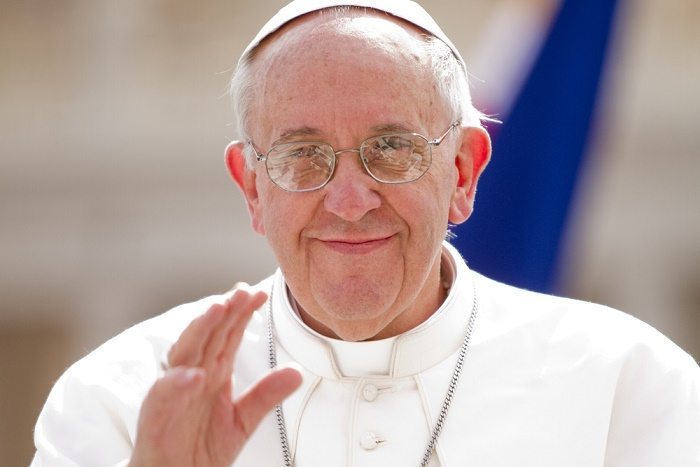Pope Francis’ Call for Equal Pay for Equal Work: Toothless, But Promising
Sadly, the more Pope Francis speaks, the more things stay the same.

The patriarch of the world’s largest patriarchy has done it again. Pope Francis ruffled feathers once more Wednesday in an address on marriage and family by calling for an end to the gender wage gap. “Why is it taken for granted that women must earn less than men?” he told a general audience in St. Peter’s Square. “No! They have the same rights. The discrepancy is pure scandal.”
This isn’t the first time that we’ve heard Pope Francis say something that sounds tolerant and socially liberal—it’s impossible to forget his call in 2013 for the Vatican to focus more on social justice and less on fighting against abortion, birth control, and marriage equality. But what followed from the official dignitaries of the Roman Catholic Church was anything but adherence to the Pope’s wise-sounding words. These are just a few examples of institutional intolerance in the name of the Vatican since then: refusing to renew the contracts of teachers who are gay, mounting ongoing legal challenges to the birth control benefit in the Affordable Care Act, and attempting to block access to abortion for migrant teenager survivors of rape in the federally funded facilities charged with serving them.
Sadly, the more Pope Francis speaks, the more things stay the same.
With this latest statement in favor of equal pay for equal work, the cruel irony is that Pope Francis has a massive problem with women in the workplace. This is no better illuminated than by examining his own workplace, where an overbearing “Girls Not Allowed” sign might as well hang above every Catholic pulpit around the globe. “The Church has spoken and says no,” Pope Francis said when asked about women’s ordination in 2013. “That door is closed.”
There’s nothing quite like a call for equal pay for equal work from a boss who openly denies every actual and prospective woman employee her ability to work as an equal.
However hypocritical, the fact that the Pope is speaking of women’s rights at all is a welcome development. Women are human beings who should enjoy equal civil and human rights, however much the Vatican typically tends to oppose them. His comments on paycheck fairness are a baby step toward a broader recognition of women’s humanity and dignity that is desperately needed within the Catholic Church and its prodigious lobbying efforts in the United States and around the world.
His comments, too, also open the door toward broader questioning. For example, if women should be paid equally in the workplace, people should be free to ask questions about other rights in spite of long-standing discriminations. Why should women and men who are gay stand to be fired, as they currently are within Catholic (and non-Catholic) workplaces? Why shouldn’t good Catholics as a matter of social justice support a robust Employment Non-Discrimination Act without gaping-wide religious exemptions that would allow institutions to continue discriminating at their preference, even if the United States Conference of Catholic Bishops stands in opposition?
For that matter, why not support an end to discrimination against women in the workplace on the basis of pregnancy and their reproductive decisions? If Pope Francis believes women have the same rights as men, why can’t women make their own decisions about abortion and birth control, and otherwise participate in society on their own terms? And the Vatican could stop working to oppose the UN Convention to Eliminate All Forms of Discrimination Against Women—after all, women should have rights, right?
While The Amazingly Tolerant Comments of Pope Francis™ are indeed toothless, they sow the seeds for future liberal inquiry in the culture as a whole. Listening and compassion, see, begets more listening and compassion, and ultimately, these things can lead to progress.
This is why hardliners—clerical and secular—get so angry when Pope Francis does progressive things like convene a global warming summit in hopes of securing ratification of a climate change treaty. For those efforts, LifeSiteNews.com and a Koch-funded group stand united in criticism of the Holy See—the former claiming that environmental efforts operate as “cover for an anti-life and anti-family agenda,” and the latter warning him not to do a “disservice” to his “moral authority.” In other words, there’s a good chance something refreshing is afoot.
Still, it’s hard not to get cynical when Pope Francis is saying one thing about women’s rights to equal pay and turning the other cheek to the equal promotion of women in his own flock. As Sister Carol Keehan, CEO of the Catholic Health Association of the United States, said one day earlier at a conference in Rome on women within the Catholic Church:
Sometimes you hear people say that [women] can’t be in that role because a woman wouldn’t be respected, it has to be a priest, a bishop … the truth of the matter is that … we raised that question in the U.S., that the Secretary of State could never be a woman … cultures didn’t accept women being in the room with men, all kinds of excuses … we’ve now had three successful women secretaries of state and there’s no countries refusing to talk to them. Just because it’s always been, doesn’t mean it always has to be.
This doesn’t mean, of course, that we can’t hope for Pope Francis to issue his call for equal pay for equal work when he comes to address Congress in September. That speech will surely be televised, and it would be delicious to watch the face of House Speaker John Boehner (R-OH) sitting behind him during those words—especially when his Republican counterparts have consistently blocked the Paycheck Fairness Act that aims to guarantee women equal pay for equal work.
